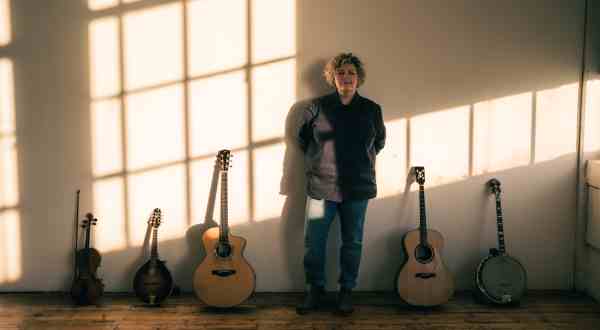

Anna Massie
It really is solo, too. Apart from a couple of tracks where she’s joined by her mum and dad on spoons and mandolin, she does everything - vocals, guitars, fiddle, mandolin, banjo and more, and produces. In some musicians’ projects that can result in something carefully multitracked lacking the liveliness of interaction with others, but not so here. She composed most of the instrumental tunes, and while, as subsequent reading of the liner notes revealed (listen first, then read if intrigued), she only wrote that first one of the five songs, they’re so well chosen and delivered that they all speak as her, their words direct, no pretension or flowery poetistics. In a beautifully clear and upfront recording they, and the eight instrumentals, jump out of the speakers and make themselves at home, welcoming the listener into her world.
The first song, “Thanks for Writing” (whose catchy appeal prompted my decision to review the album), stems from a video diary, the ‘Black Isle Correspondent,’ that she did at her parents’ home in Fortrose on the Black Isle during the Covid pandemic period, continuing for 154 daily episodes. It gained followers, some of whom sent letters and postcards addressed simply to “Anna Massie, Black Isle Correspondent” that, thanks to the local postie, arrived safely. The videos are still up on YouTube. (The Black Isle isn’t quite an island, it’s a peninsula between three of Scotland’s eastern firths to the north of Inverness). She didn’t write the other four songs on the album, but she inhabits them and makes them her own. The witty love and disaster song “My Life Is Over Again” by Cape Breton songwriter J.P. Cormier (which she notes “would be pretty tragic if it didn’t have such a jolly tune”), gets a burst of mouth-trumpet and backing vocals, and has the catchy memorability of a country hit. Rick Taylor’s “Anything From You” is a bitter-sweet expression of simultaneous lost-love yearning and self-reliance. She brings a caring warmth to her unexpected cover of “I Think We’re Alone Now” by Ritchie Cordell, a hit for Tommy James and the Shondells in 1967 (followed by others including Tiffany and, in the UK in 2006, Girls Aloud).
Despite her evident fondness for home and crosswords, I suspect that she’s more of an outdoor type than the character expressed in the mandolin-accompanied Tom Morgan song “The Outdoor Type,” who’s “never set foot inside a tent, can’t build a fire to save my life”; though for a fortnight isolating in her Glasgow flat she was an involuntary indoor type.
The instrumental “Dinner Medals,” at first bouncy mandolin-led then switching to a scamper of fiddle and guitar with a final wordless singalong vocal, is dedicated to the fine art of ‘splootering’ (accumulating mementoes of your menu down your frontage; remember the word and use it wisely). “The Lovat Bar” is a flowing, lurching tune, first on guitar and then fiddle and guitar, written as a long-service award for her guitar students at Blazin’ Fiddles’ annual fiddle school, Blazin At Beauly. It’s banjo for the lead, joined by guitar and a veritable brass section of mouth-trumpets, in “The Coronation Hornpipe / 100 Days,” the latter a Massie-composed hornpipe celebrating 100 days of the Black Isle Correspondent, to go with the garden party tea and pancakes “on Nana’s Silver Wedding China.”
The elegant “The Pioneers’ Waltz,” on solo guitar later joined by fiddle, is a tribute to her parents Bob and Alison, inspired by seeing them gardening to produce food for the family table, like the pioneers of the old west, though their horticulture proved more successful with the salad leaves and courgettes than the tatties and parsnips. And said pioneers, who appear often in the Black Isle Correspondent videos, contribute mandolin and spoons on “Göran Berg’s Polka,” written by dad Bob for a Swedish friend.
Find the artist online.
Search RootsWorld
|